-
 Bitcoin
Bitcoin $91,256.3033
3.39% -
 Ethereum
Ethereum $1,723.5244
5.98% -
 Tether USDt
Tether USDt $1.0006
0.10% -
 XRP
XRP $2.1808
2.69% -
 BNB
BNB $611.6352
1.26% -
 Solana
Solana $145.2440
4.71% -
 USDC
USDC $1.0001
0.07% -
 Dogecoin
Dogecoin $0.1726
6.92% -
 TRON
TRON $0.2472
1.71% -
 Cardano
Cardano $0.6638
3.44% -
 Chainlink
Chainlink $14.0337
4.16% -
 Avalanche
Avalanche $21.8740
6.44% -
 UNUS SED LEO
UNUS SED LEO $8.9676
-1.35% -
 Stellar
Stellar $0.2598
-0.15% -
 Sui
Sui $2.4368
8.47% -
 Shiba Inu
Shiba Inu $0.0...01309
4.18% -
 Hedera
Hedera $0.1782
3.94% -
 Toncoin
Toncoin $2.9908
-0.39% -
 Bitcoin Cash
Bitcoin Cash $361.0314
4.64% -
 Hyperliquid
Hyperliquid $18.8127
3.63% -
 Litecoin
Litecoin $82.7354
3.19% -
 Polkadot
Polkadot $3.9250
0.37% -
 Dai
Dai $1.0001
0.03% -
 Bitget Token
Bitget Token $4.5168
0.88% -
 Ethena USDe
Ethena USDe $0.9994
0.01% -
 Pi
Pi $0.6419
0.67% -
 Monero
Monero $219.7573
2.35% -
 Pepe
Pepe $0.0...08517
7.03% -
 Uniswap
Uniswap $5.6768
4.46% -
 Aptos
Aptos $5.1717
0.94%
How transparent is an Ethereum ETF?
Transparency is essential for evaluating Ethereum ETFs; consider the fund management team, reporting frequency, underlying asset custody, and blockchain analytics capabilities to assess the trustworthiness and accuracy of the ETF's holdings and operations.
Feb 17, 2025 at 01:49 pm

Key Points:
- Definition of an Ethereum ETF
- Benefits of investing in an Ethereum ETF
- Considerations for evaluating Ethereum ETF transparency
- Comparison of leading Ethereum ETFs based on transparency criteria
- Regulatory landscape for Ethereum ETFs
- Risks associated with investing in Ethereum ETFs
- Frequently Asked Questions
How Transparent is an Ethereum ETF?
Definition of an Ethereum ETF
An Ethereum exchange-traded fund (ETF) is an investment vehicle that tracks the price of Ethereum, the second-largest cryptocurrency by market capitalization. It provides exposure to Ethereum without the need to purchase the cryptocurrency directly, offering investors a more convenient and accessible way to invest.
Benefits of Investing in an Ethereum ETF
- Diversification: Ethereum ETFs allow investors to diversify their cryptocurrency portfolios, reducing the risk associated with holding a single asset.
- Convenience: ETFs offer easy trading and low transaction costs, making it convenient to invest in Ethereum.
- Potential Growth: Ethereum is a promising asset with a rapidly growing ecosystem, providing potential for appreciation.
- Passive Income: Some Ethereum ETFs offer dividend distributions based on the staking rewards generated by the underlying Ethereum holdings.
Considerations for Evaluating Ethereum ETF Transparency
Transparency is crucial when evaluating an Ethereum ETF. Investors should consider the following criteria:
- Fund Management: Analyze the track record, experience, and disclosures of the fund managers to assess their trustworthiness.
- Reporting Frequency: Determine the frequency and detail of the fund's financial and performance reporting.
- Underlying Assets: Verify the composition and custody of the underlying Ethereum assets held by the ETF.
- Blockchain Analytics: Utilize blockchain analytics tools to track the movement of the underlying Ethereum holdings and ensure they match the reported data.
Comparison of Leading Ethereum ETFs Based on Transparency Criteria
1. Purpose Ethereum ETF (ETHH)
- Fund Management: Managed by Purpose Investments, a leading Canadian asset manager with a strong track record in digital asset investment.
- Reporting Frequency: Provides daily exposure and real-time pricing information.
- Underlying Assets: Holds Ethereum tokens in secure cold wallets custodized by Coinbase and BitGo.
- Blockchain Analytics: Supports blockchain analysis and audit verification.
2. Grayscale Ethereum Trust (ETHE)
- Fund Management: Managed by Grayscale Investments, the largest digital asset investment fund manager in the world.
- Reporting Frequency: Publishes monthly financial reports and provides frequent updates on the underlying Ethereum holdings.
- Underlying Assets: Stores Ethereum in offline cold wallets with high-security protocols.
- Blockchain Analytics: Supports limited blockchain analysis due to the trust structure.
3. VanEck Ethereum ETF Trust (VETH)
- Fund Management: Managed by VanEck, a global investment management firm known for its expertise in ETFs.
- Reporting Frequency: Provides daily performance and holdings information.
- Underlying Assets: Holds Ethereum tokens in a combination of cold and hot wallets under the custody of Coinbase.
- Blockchain Analytics: Offers periodic blockchain audit reports to enhance transparency.
4. WisdomTree Ethereum Trust (ETHW)
- Fund Management: Managed by WisdomTree, a provider of innovative investment products and ETFs.
- Reporting Frequency: Publishes daily net asset value (NAV) and monthly fund performance reports.
- Underlying Assets: Stores Ethereum tokens in diversified custody arrangements, including Coinbase, Gemini, and BitGo.
- Blockchain Analytics: Uses a combination of blockchain analysis tools and direct custody verification to ensure transparency.
Regulatory Landscape for Ethereum ETFs
The regulatory landscape for Ethereum ETFs is evolving. In the United States, the Securities and Exchange Commission (SEC) has yet to approve a spot Ethereum ETF, citing concerns over market manipulation and volatility. However, several futures-based Ethereum ETFs have been approved by the SEC.
Risks Associated with Investing in Ethereum ETFs
- Underlying Asset Risk: The value of Ethereum ETFs is linked to the price of Ethereum, which is a volatile asset.
- Manager Risk: The performance of Ethereum ETFs depends on the competence and integrity of the fund managers.
- Regulatory Risk: The regulatory landscape for Ethereum ETFs is uncertain, and future regulations could impact the availability and terms of these products.
- Custodial Risk: The security of Ethereum ETFs depends on the reliability and safety of the custody arrangements for the underlying assets.
FAQs
1. Why are Ethereum ETFs important?
Ethereum ETFs provide a convenient and accessible way to invest in Ethereum, offering diversification, potential growth, and passive income.
2. How do I evaluate the transparency of an Ethereum ETF?
Consider the fund management team, reporting frequency, underlying asset custody, and the availability of blockchain analytics.
3. Are Ethereum ETFs subject to regulation?
The regulatory landscape for Ethereum ETFs is evolving. In the United States, spot Ethereum ETFs are not yet approved, but several futures-based Ethereum ETFs have been approved by the SEC.
4. What are the risks of investing in an Ethereum ETF?
Risks include the volatility of the underlying Ethereum asset, the competence of the fund managers, regulatory uncertainty, and the safety of the underlying asset custody arrangements.
Disclaimer:info@kdj.com
The information provided is not trading advice. kdj.com does not assume any responsibility for any investments made based on the information provided in this article. Cryptocurrencies are highly volatile and it is highly recommended that you invest with caution after thorough research!
If you believe that the content used on this website infringes your copyright, please contact us immediately (info@kdj.com) and we will delete it promptly.
- Dogecoin (DOGE) Consolidates Within a Symmetrical Triangle, Breakout or Decline on the Cards
- 2025-04-23 00:00:53
- BitGo Integrates sBTC, Expanding Institutional Participation in Decentralized Finance
- 2025-04-23 00:00:53
- Fartcoin (FARTCOIN) Price Prediction 2025-2030: Will FARTCOIN Price Hit $5 Soon?
- 2025-04-22 23:55:12
- Integral Ad Science Holding Corp (NASDAQ: IAS) closed at $6.38, down -2.15%
- 2025-04-22 23:55:12
- Dogecoin Faces Pressure as Elon Musk's Federal Role Nears an End
- 2025-04-22 23:50:12
- MANA Token Price Breaks Long-Term Resistance, Surging 18%
- 2025-04-22 23:50:12
Related knowledge
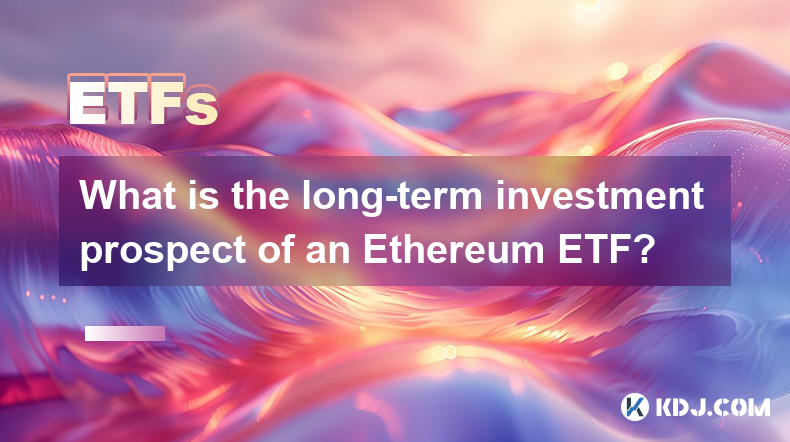
What is the long-term investment prospect of an Ethereum ETF?
Mar 18,2025 at 03:01pm
Key Points:Uncertainty surrounds the long-term prospects of an Ethereum ETF due to regulatory hurdles and market volatility.Approval hinges on regulatory clarity regarding cryptocurrencies, especially concerning investor protection and market manipulation.Successful ETF launches could boost Ethereum's price and adoption, but failure could negatively imp...
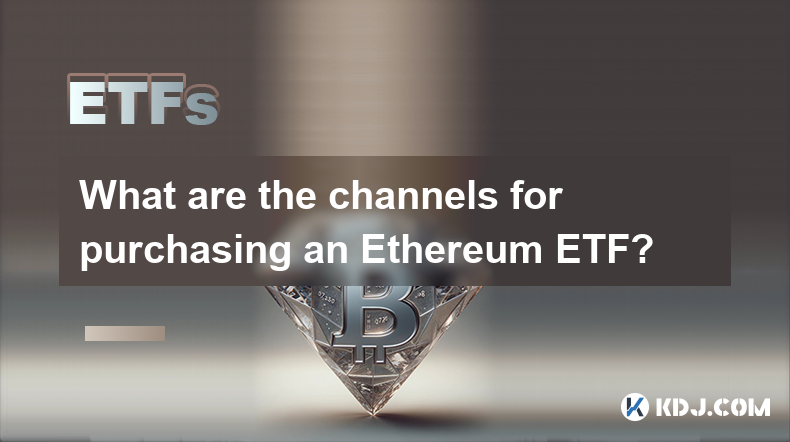
What are the channels for purchasing an Ethereum ETF?
Mar 18,2025 at 01:49am
Key Points:Currently, there are no Ethereum ETFs available for direct purchase by the general public in most major markets.Access to Ethereum exposure through ETFs is limited, mainly through futures-based ETFs.Purchasing Ethereum directly or through other investment vehicles remains a viable alternative.Regulatory hurdles and market complexities signifi...
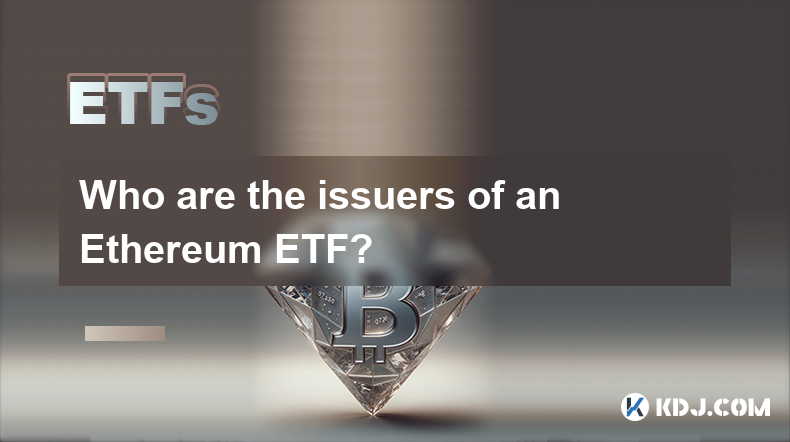
Who are the issuers of an Ethereum ETF?
Mar 19,2025 at 08:07pm
Key Points:There are no currently approved Ethereum ETFs in the US, meaning no single issuer can be definitively named. However, several firms have filed applications.The issuers of potential Ethereum ETFs will be large, established financial institutions, typically asset management companies.The specific requirements for ETF issuers are stringent and o...
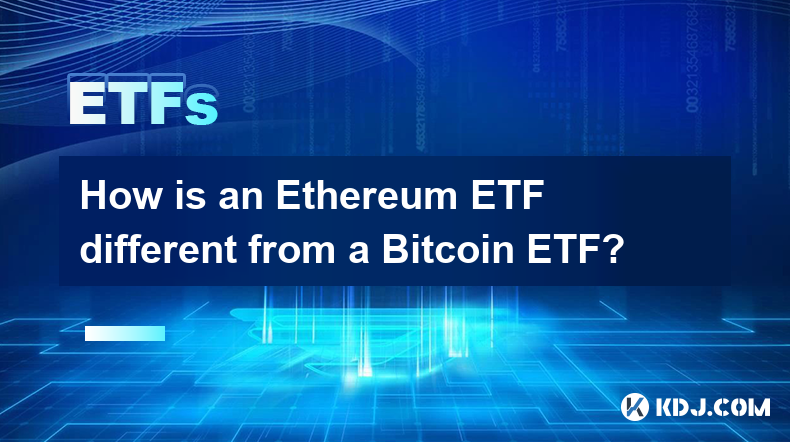
How is an Ethereum ETF different from a Bitcoin ETF?
Mar 17,2025 at 10:55am
Key Points:Underlying Asset: The core difference lies in the underlying asset: an Ethereum ETF tracks the price of Ether (ETH), while a Bitcoin ETF tracks the price of Bitcoin (BTC).Technology and Use Cases: Ethereum's blockchain supports smart contracts and decentralized applications (dApps), creating a distinct technological and investment narrative c...
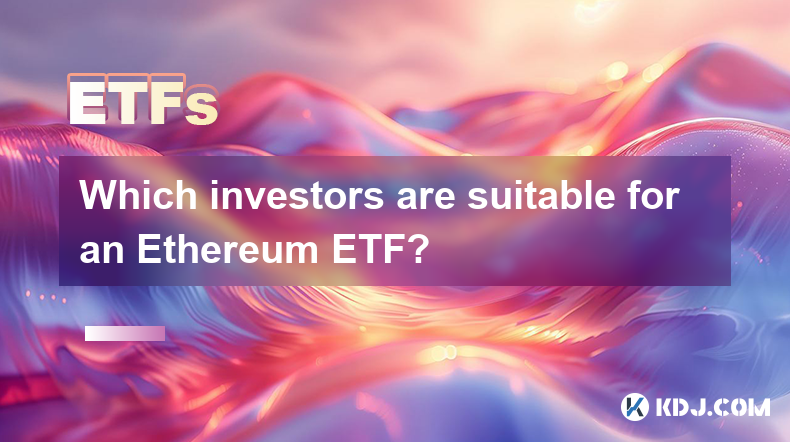
Which investors are suitable for an Ethereum ETF?
Mar 16,2025 at 05:50pm
Key Points:Risk Tolerance: Ethereum ETF investment requires a high risk tolerance due to the volatility of the cryptocurrency market.Investment Goals: Investors seeking long-term growth potential and exposure to the Ethereum ecosystem are suitable candidates.Investment Horizon: A longer-term investment horizon is crucial to weather market fluctuations.U...
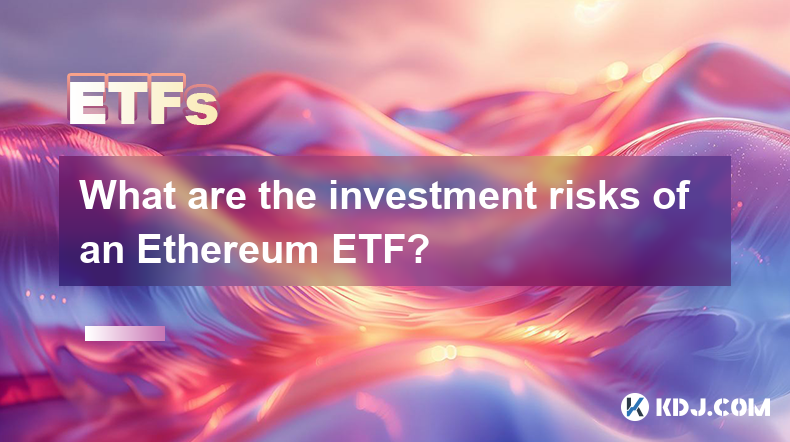
What are the investment risks of an Ethereum ETF?
Mar 18,2025 at 02:12am
Key Points:Price Volatility: Ethereum's price is highly volatile, impacting ETF share prices.Regulatory Uncertainty: Changes in regulatory landscapes can significantly affect ETF trading and performance.Market Manipulation: The potential for market manipulation, particularly in smaller ETFs, exists.Underlying Asset Risk: Risks associated with the Ethere...

What is the long-term investment prospect of an Ethereum ETF?
Mar 18,2025 at 03:01pm
Key Points:Uncertainty surrounds the long-term prospects of an Ethereum ETF due to regulatory hurdles and market volatility.Approval hinges on regulatory clarity regarding cryptocurrencies, especially concerning investor protection and market manipulation.Successful ETF launches could boost Ethereum's price and adoption, but failure could negatively imp...

What are the channels for purchasing an Ethereum ETF?
Mar 18,2025 at 01:49am
Key Points:Currently, there are no Ethereum ETFs available for direct purchase by the general public in most major markets.Access to Ethereum exposure through ETFs is limited, mainly through futures-based ETFs.Purchasing Ethereum directly or through other investment vehicles remains a viable alternative.Regulatory hurdles and market complexities signifi...

Who are the issuers of an Ethereum ETF?
Mar 19,2025 at 08:07pm
Key Points:There are no currently approved Ethereum ETFs in the US, meaning no single issuer can be definitively named. However, several firms have filed applications.The issuers of potential Ethereum ETFs will be large, established financial institutions, typically asset management companies.The specific requirements for ETF issuers are stringent and o...

How is an Ethereum ETF different from a Bitcoin ETF?
Mar 17,2025 at 10:55am
Key Points:Underlying Asset: The core difference lies in the underlying asset: an Ethereum ETF tracks the price of Ether (ETH), while a Bitcoin ETF tracks the price of Bitcoin (BTC).Technology and Use Cases: Ethereum's blockchain supports smart contracts and decentralized applications (dApps), creating a distinct technological and investment narrative c...

Which investors are suitable for an Ethereum ETF?
Mar 16,2025 at 05:50pm
Key Points:Risk Tolerance: Ethereum ETF investment requires a high risk tolerance due to the volatility of the cryptocurrency market.Investment Goals: Investors seeking long-term growth potential and exposure to the Ethereum ecosystem are suitable candidates.Investment Horizon: A longer-term investment horizon is crucial to weather market fluctuations.U...

What are the investment risks of an Ethereum ETF?
Mar 18,2025 at 02:12am
Key Points:Price Volatility: Ethereum's price is highly volatile, impacting ETF share prices.Regulatory Uncertainty: Changes in regulatory landscapes can significantly affect ETF trading and performance.Market Manipulation: The potential for market manipulation, particularly in smaller ETFs, exists.Underlying Asset Risk: Risks associated with the Ethere...
See all articles























































































